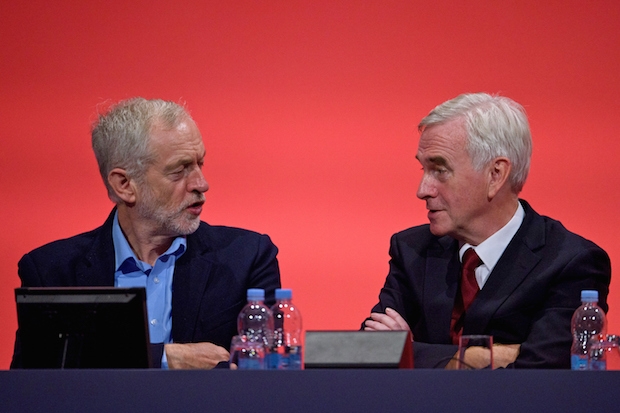The most remarkable thing about John McDonnell’s Labour conference speech was that he was delivering it at all. The new Shadow Chancellor was clearly trying to assuage fears about him by being as boring (something he’d promised) and mild as possible, announcing reviews headed by big names such as Bob Kerslake of the operation of the Treasury and and an Economic Advisory Committee that includes Thomas Piketty and Joseph Stigltiz. Reviews and committees mean you don’t have to announce as many policies, which is handy if you’re trying not to rock the boat too much early on. But to be fair to McDonnell, it’s also what all mainstream politicians do when they come into the job.
He said ‘this is not my usual rant’ and that ‘I’ve promised Jeremy to behave myself’. It was not his usual style of performing in the Commons. Clearly the party leadership has decided that too much passion from the stage may be written up as leftist ranting.
But McDonnell went further than that, using language that Blairites would usually use on the economy. He used the phrase ‘Labour will always ensure that this country lives within its means’, which Liz Kendall found herself being booed for saying during the leadership contest. He said ‘of course we accept that there is a deficit’. He clearly wanted to challenge any narrative that this Labour party is one of ‘deficit deniers’.
But McDonnell also wanted to attack austerity in a way that his predecessors haven’t. He said ‘austerity is not an economic necessity, it’s a political choice’. In his opening sentences, he said ‘austerity is just a word almost meaningless to many people’. For McDonnell, this is because politicians have failed to explain its dangers to voters, not because voters are, on the whole, sufficiently comfortable with spending cuts to not get particularly worked up by the word ‘austerity’.
The most threatening bit of the Shadow Chancellor’s speech was delivered as gently as the rest of it. In closing, he said:
‘I admit that I was disappointed that after Jeremy’s election some refused to serve. In the spirit of solidarity upon which our movement was founded, I say come back and help us succeed.’
Now, this all sounds very nice and friendly. But what does it mean if MPs just don’t think that the current Labour leadership is one they can submit to? Former shadow minister John Woodcock has already tweeted that this was ‘a bit arrogant and divisive’. Other former frontbenchers may feel as though they are being accused of not being truly Labour if they don’t get involved.







Comments